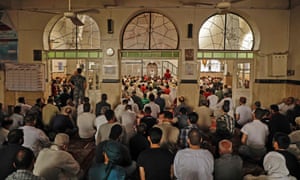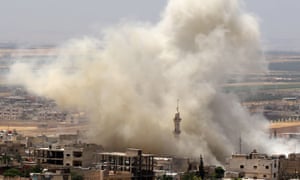Wed 05 June 2019:
War-weary citizens mark end of Ramadan as Assad regime continues to bombard province
Sara Akhtib loves her new Eid outfit. It was made by her mother: a flowing gold and black dress embroidered with black flowers on the hem.
Like the rest of Syria’s rebel-held Idlib province on Tuesday, the 21-year-old student was celebrating the end of Ramadan. However, instead of visiting relatives, Akhtib, her parents and three younger brothers did not leave the basement below the family home. The Syrian president’s warplanes were still in the sky and it was too dangerous to go outside. “We spent last night in the basement with our neighbours,” Akhtib said over the phone from her home in Kafranbel. “A rocket hit a house in our neighbourhood and the fire almost spread to our house. My brothers can’t go out and play. But I’m going to wear my Eid clothes and try to be happy. I don’t have a choice.”
Hundreds of people have left the town, which has been heavily targeted during the last five weeks in a ferocious aerial campaign on Syria’s last rebel stronghold by Bashar al-Assad and his Russian allies. Market streets that should be full of people buying and selling traditional Eid sweets have been empty for the last few days, Akhtib said. The end of Ramadan has brought no respite in the fighting. More than 270,000 people have been displaced in recent weeks, leaving thousands to celebrate Eid with what little they have left under sheets stretched over the branches of olive trees.

Syrians attend Eid prayers at a mosque in the city of Idlib. Photograph: Abdullah Hammam/AFP/Getty Images
At least 25 hospitals and other critical infrastructure such as civil defence rescue centres have been targeted in what dozens of prominent doctors have said is a blatant breach of international humanitarian law. In May, 5,400 airstrikes killed at least 316 people, according to the Syrian Observatory for Human Rights.
Medical workers in Idlib said on Monday they would no longer share the locations of hospitals and clinics with the United Nations after doing so failed to stop them becoming Syrian and Russian targets. At least nine facilities whose coordinates were passed on to Moscow in an effort to protect them have come under fire in the last month. Also on Monday, an air-to-surface missile hit a market in the town of Maarat al-Numan, killing three people and injuring 11, a doctor said. In Kafranbel, a boy already dressed in his finest clothes in preparation for Eid was killed in the attack that almost destroyed the Akhtib family home.
“Over the holy month of Ramadan our cities have been completely destroyed and people have had to abandon their homes. Their planes are always in the air,” said Othman al-Othman, a 25-year-old civil defence service volunteer from Kafranbel. “Every day brings a new massacre.” Idlib’s population has swollen from 1 million to about 3 million since Syria’s war broke out in 2011 and the province is the last opposition area that remains outside Assad’s control.

Smoke rises following a reported airstrike in the town of Khan Sheikhun, Idlib. Photograph: Anas Al-Dyab/AFP/Getty Images
A ceasefire brokered last September to avert what aid agencies warned would be the worst humanitarian crisis in the already bloody war has been shattered, after control of Idlib was seized by the hardline Islamist group Hayat Tahrir al-Sham (HTS). Damascus and Moscow say the HTS takeover legitimises the campaign against Idlib as they are targeting terrorists not covered by the ceasefire deal. At the UN on Monday night, Russia blocked a security council statement criticising the Syrian government campaign on Idlib, the second such move by the delegation since the escalation began on 30 April.
Russia said the proposed statement was “unbalanced” because it did not mention the Syrian towns of Hajin or Baghuz, where it says civilians have suffered during US-backed fighting against Islamic State, according to Agence France-Presse. Russia has also rejected a tweet from the US president, Donald Trump, demanding Russia and Syria “stop bombing the hell out of Idlib” and “indiscriminately killing innocent civilians”. The Kremlin press spokesman, Dmitry Peskov, said it was “unacceptable” to expect Moscow and Damascus not to retaliate against rebel and HTS shelling of government areas and Russian military bases.
The Guradian
Think your friends would be interested? Share this story!





